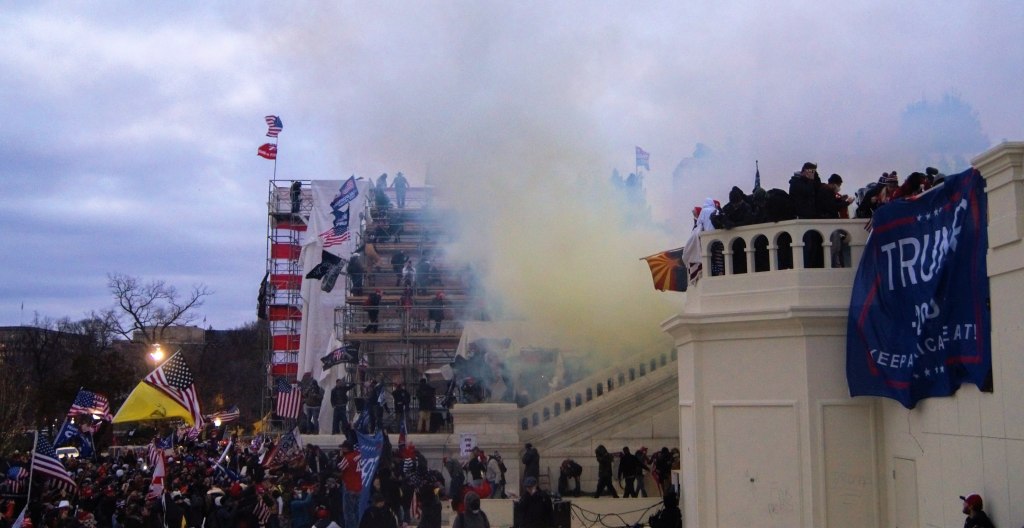
As I write this last blog post of 2023, a new year is only days away. Another Christmas has passed, along with the hopes and wishes every Christmas inspires. I am still hoping for something this year that I thought would never be on my wish list. I hope the American experiment doesn’t fail. I hope the Republic that was the vision of a group of enlightened thinkers almost 250 years ago doesn’t crumble. I hope the U.S. Constitution isn’t replaced with a less representative form of government. I hope the democratic principles that have guided this nation’s trajectory for so many generations aren’t cast aside, even if we have never honestly embraced or implemented them holistically. I hope we don’t give up on the dream of liberty and justice for all.
What concerns me most as we head into 2024, the year of our next presidential election, is the fact that a sizeable minority of our population no longer supports the concept of a limited, restrained government. Oh, they certainly say they do. In fact, they scream it. Some of them think the only function of government should be defense of the borders, so they have no respect for the legislative or judicial branches of government. They constantly espouse the virtue of state’s rights, but that’s only because they don’t believe the federal government has a role in governing the affairs of the population. When it comes down to it, many of them would be perfectly happy if they never heard from their state capitals again, especially in the form of a tax bill every year. Not only is all politics local for them, but just about everything else is too, and that’s the way they prefer it.
However, there is one branch of government that they have decided should be virtually untouchable: the executive branch. They want this branch to be untethered by legislators, judges, law enforcement, or even laws for that matter. They believe this branch should essentially be above the law. They think this branch should have the power and authority to do whatever it deems necessary for the nation to achieve greatness and superiority over all other nations. Most importantly, they want this type of omnipotence concentrated in the hands of one individual, the person they wish to see occupying the White House, and no one else. They are convinced that only one person is qualified for this totalitarian position. They earnestly believe this person has the skills, experience, knowledge, and determination to transform the country into what they want it to be. They just don’t quite understand that authoritarianism is not an example of small government. History has taught us that it is quite the opposite.
This minority of the population has been building, organizing, communicating, and planning for many years. The exact origin of the movement is debatable. It has mostly existed underground and on the fringes of society, and in modern times, it has taken advantage of the Internet, empowered especially through social media. Perhaps it has waxed and waned over most of U.S. history, sweeping across both sides of the political spectrum; however, in the 21st century it surfaced and became extremely vocal among the ultra-conservative right. The movement’s members were like a volatile collection of chemicals, just waiting for the right catalyst to come along and fully activate them.
By definition, a catalyst causes or magnifies a reaction without ever undergoing any permanent change itself. The catalyst in this case had been a larger-than-life personality in American society for decades. Born into wealth, he was groomed to be an entrepreneur, rising to celebrity status while building a commercial empire with the assistance of domestic and foreign credit and always grabbing the attention of mass media. He built relationships with some of the wealthiest and most powerful members of society in the U.S. and around the world. His business ethics and methods were often the target of scrutiny, if not serious accusation of wrongdoing, but his reptilian instinct served him well as he maneuvered through the legal system emerging mostly unscathed. His devoted fans have often admitted that he may not be eloquent, but he always speaks his mind and means what he says, which they really admire. Of course, when he said something that sounded dangerous or immoral, they were quick to backtrack and say that you can’t pay attention to what he says, just focus on what he does. Makes perfect sense.
The qualities and characteristics that made him most appealing to the movement were his apparent great wealth, his arrogance, his boastful nature, his dissatisfaction with the federal government, and his insistence that the nation was on the wrong path primarily because it could not protect its borders and because it repeatedly made bad deals with foreign powers that never put America first. Nevertheless, he promised that he, and he alone, could rescue the country. He would rid the nation’s capital of the corrupt bureaucrats and lobbyists, or “drain the swamp,” a phrase often used by Benito Mussolini as he rose to power in Italy in the 1920s. The catalyst would secure the southern border with Mexico by building a massive wall, promising to make the Mexican government pay for it. He would remove all government regulations and restrictions that hindered business pursuits and the accumulation of wealth. He wanted patriots to join him in the noble cause to Make America Great Again. The catalyst’s name was Donald J. Trump, who ran for President of the United States and was elected in 2016 with the help of this growing political and social movement.
History will judge how successful Trump’s administration was in fulfilling his promises to his base and to the population at large, but there is no real debate about what happened when he was defeated in his attempt to win a second term in office. He didn’t just claim that the election was stolen, which other candidates before him had done (including Hillary Clinton when she lost to Trump). He went much further. He used those claims to support his attempts to stay in office, even to the point of trying to overturn the election results. When Vice-President Mike Pence proceeded to certify the election on January 6, 2021, despite Trump’s demand that the process be halted, a subset of this movement’s members stormed the U.S. Capitol, a mob that had been encouraged by Trump. He publicly praised their efforts to interrupt the peaceful transfer of power from his administration to that of the newly elected President, Joe Biden.
Over 1,100 rioters who invaded and vandalized the Capitol (resulting in several deaths) from all fifty states were charged with a variety of crimes associated with the incident, and close to 400 people were sentenced to prison for their actions. Other indictments and lawsuits have been filed for alleged crimes involving attempts to overthrow the election, some committed by close associates of President Trump. His most loyal supporters still deny that Trump lost the election, including elected and appointed state officials, Republicans in Congress, lawyers, some of Trump’s former cabinet members, journalists, radio talk show personalities, and Fox News program hosts. Thus far, no evidence brought before any state or federal court that I’m aware of has offered conclusive proof of interference, tampering, or fraud sufficient to overthrow or reconsider the election results. And yet, millions of people across the country still believe that Trump actually won his bid for reelection.
Over the last twelve months as individuals began to solidify support for their candidacy for the Republican primary leading up to the next presidential election, it became abundantly clear that Donald Trump was going to be the frontrunner. Now at the end of the year, his numbers across a wide spectrum of polling organizations far exceed any other Republican hopeful. He has been noticeably absent at all Republican debates. He doesn’t need to be there. He is winning by a long shot. And just as he did leading up to the last election, he is pounding a clear message home to his base: if he doesn’t win this election in 2024, then the election will be fraudulent. To his loyal base, there will be only one conclusion if he doesn’t win. The election was stolen. They will accept no alternative outcome other than a victory for Donald Trump, a man who now faces numerous federal and state indictments for alleged crimes associated with the last election and attempts to overthrow it.
Here’s where it gets frightening. Trump’s base, the movement for which he served as a catalyst, has illustrated it is willing to resort to violence to achieve the agenda of overthrowing the government to give Donald Trump total control. They are also likely among the most heavily armed civilians in the country. Over the years, especially during his presidency, Trump demonstrated his admiration and respect for totalitarian leaders around the world, including Vladimir Putin in Russia, Kim Jong Un in North Korea, and Xi Jinping of China. He even committed the embarrassing diplomatic faux pas of saluting Kim Jong Un during an official meeting with the supreme leader. In a recent town hall session hosted by Sean Hannity of Fox News, Trump stated that he would be a dictator for one day once he was reelected. This type of authoritarian rhetoric has become more common for Trump, and his base seems perfectly happy with it. To my way of thinking, these folks are ravenous for a dictator, as long as his name is Donald J. Trump.
So, I am concerned about our Republic’s future. I dread the turbulent political landscape that lies ahead leading up to the 2024 election in November. I am troubled over the lack of conviction among Republican lawmakers who continue to feed into the conspiracies and lies about the last election. I am saddened that the handful of men and women in Congress who had the spine to stand up to Trump and the election deniers were publicly castigated by the former President and their own colleagues, then promptly voted out of office. Most of all, I am worried that no matter the outcome of the election, the system of law and order that distinguishes us as a nation may be threatened.

